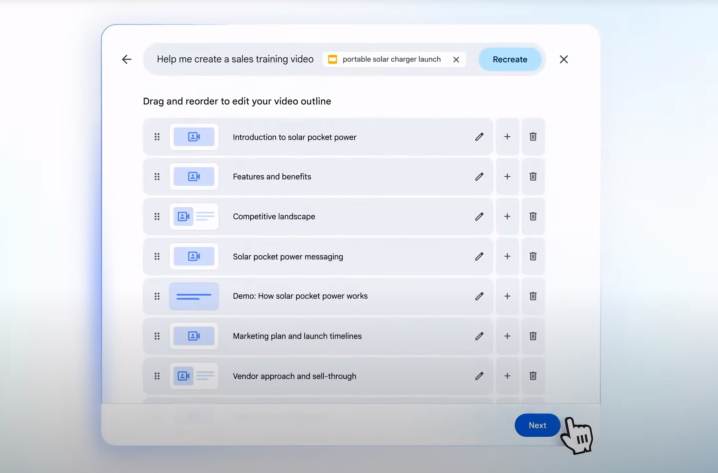
Google quietly announced an AI-powered video creation app today. Called Google Vids, the new app is designed for Google Workspace users and uses the power of Google Gemini to help you create informational videos for the workspace.
Currently in testing with select Google Workspace Labs users (a public beta ispromised for later), the new online tool builds on some of the AI-powered features we’ve already seen in Google’s other apps like Docs, Sheets, and Slides. The difference is that with Google Vids, you can manually create a video storyboard using your media or use AI to create one using basic words and simple prompts. This allows you to edit and put together much more informative videos in a short time.
You’ll be able to upload your media to the storyboard and choose stock videos, images, and background music. Of course, the app has a voiceover feature too, with the ability to generate or create a script using AI. The interface seems similar to Google Slides and easy to use, as the company depicts in the launch video below.
Google Vids is primarily for work purposes. You’re not going to be creating personal YouTube videos with this tool, and its primary function seems to be for sales training videos, or even onboarding videos, vendor outreach, and project updates. You’ll have full access to different styles, and templates. Like all Google Workspace apps, there’s even a collaborative aspect, and you can have colleagues join in to help you create content or comment on your work.
This paid Google product is for enterprise and work use. The Verge reports that it doesn’t have a YouTube integration at the moment and videos are limited in time to under three minutes. More features could be coming soon, however.
Google Vids does seem pretty similar to Microsoft’s own Clipchamp, which is a free-to-use online video editor for consumers and enterprise users. Clipchamp has an AI video editor tool, which lets you auto-compose short videos using your content by understanding the scenes in your media. It also has an AI voiceo-ver feature, which can turn text into speech.
Editors' Recommendations
- AI is about to change video production forever
- 5 calendar apps you should use instead of Google Calendar
- How to use Google Gemini, the main challenger to ChatGPT
- Google may build Gemini AI directly into Chrome
- OpenAI’s new AI-made videos are blowing people’s minds


